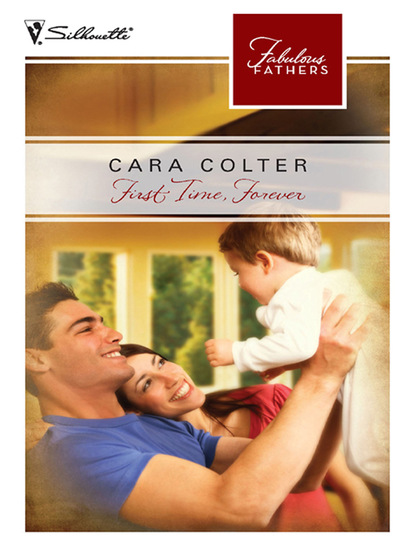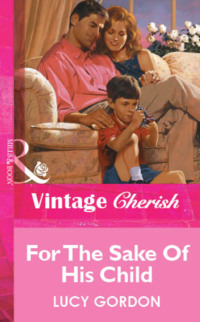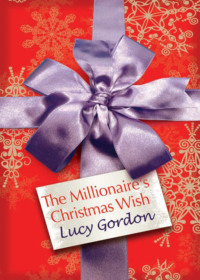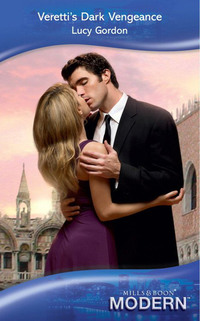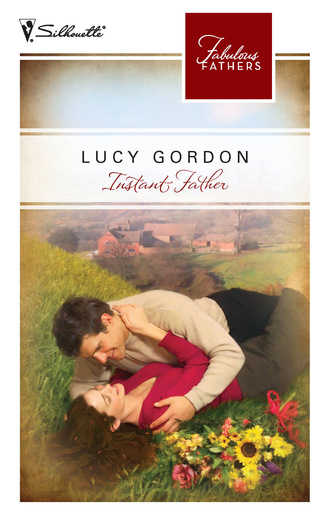
Полная версия
Instant Father
“Certainly,” he said grimly.
Norah showed her out while Gavin tried to force himself to calm down. On the one hand he was possessed by sheer speechless outrage at Norah’s impertinence at guaranteeing his behavior. But he knew that he owed everything to her generous intervention. In fact he owed her his total gratitude, and that was almost the worst thing of all.
When she returned he said with difficulty, “Thank you for speaking up for me. It wasn’t what I expected.”
“I never believed that kidnap story. You had ample chance to make off with Peter, but you didn’t.”
“But you could have had me thrown out of the house,” he said bewildered. “Why pass up your advantage?”
He came from a world where only a fool let an opportunity slip, and this woman wasn’t a fool. That was clear from the shrewd intelligence in her eyes as they surveyed him, their gleam showing that she fully understood his mystification.
“Maybe I was wrong to pass it up,” she said. “We’ll just have to see how things work out.”
“I gave my word and I’ll keep it. All I want is to rebuild my relationship with Peter.”
“Well, I’ve given you the chance to do that,” she pointed out.
“But I wish you’d tell me—why did you do it?”
“Because getting to know you again might be the best thing for him.”
“I know that’s what you told that woman but—”
She sighed. “Look, Hunter, the reason I gave was the true reason. I suppose in your sphere that’s unheard of.”
“Pretty well,” he admitted.
“Well, welcome back to the real world.”
“Real world? You call this—this Norah’s Ark—the real world?”
“It’s a sight more real than a businessman’s fantasyland, where only figures on paper matter and the people they represent are treated as irrelevancies—or even nuisances.”
Gavin took a deep breath. “I don’t want to quarrel with you. You did me a favor, and I’m grateful. As you say, I have to get to know my son again, so if you don’t mind I’m going to start now. Where is he?”
“Outside with the animals.”
Gavin strode out of the house and through the grounds, confused by the profusion of large wire pens. He came across a woman mashing up feed. She was about sixty, very fat and puffing. Her grey hair was cut short and on her feet she wore a pair of ancient men’s shoes. She eyed Gavin with a caution that revealed she’d been warned about him, but her manner was reasonably friendly. “I’m Iris,” she told him. “I help Norah out with the animals.”
He introduced himself politely and said, “I’m looking for Peter.”
“He was here a moment ago, but he went off to do something else. Try down that path.”
He followed her directions. As he pushed through a clump of hedges he could hear the sea in the distance, but there was no sign of Peter, just a young man in torn jeans and shirt, with his long hair held in a ponytail. He peered at Gavin from within a huge bird cage. A tall tree dominated the center of the cage and the young man was nearly at the top, making some repair, hanging by his knees like a trapeze artist. “Help you?” he called.
“Have you seen a boy of about ten?” Gavin called back.
“He came through here a while back, but he didn’t stop. He was running to somewhere.”
Gavin thanked him and went on. Another few yards brought him to the perimeter fence. He turned left and began to make his way back until he came to a large wire pen with a wooden hut at the rear. There was no sign of whichever animal lived here, but a scuffling inside the hut told him that there was an occupant. He was about to pass on when he heard more scuffling, followed by a soft, urgent, “Ssshh!”
He froze as the truth hit him. His son was hiding in that hut. But not from him, surely? Not from his own father?
“Peter,” he called. “Peter.”
He listened. There wasn’t another sound, but despite the silence he knew Peter was in there. And now he had to face it. Peter was avoiding him. Tight-lipped, he stormed back to the house. “What in God’s name have you told my son to make him run away from me?” he demanded when he found Norah.
“Nothing. You did it all yourself. I told you, he heard what you said about taking him away. You’ve got to reassure him about that before you can get anywhere.”
“I was trying to reassure him. I wanted to tell him what we’ve agreed, that I’m staying here with him for a while.”
“Well, he doesn’t know that. He saw you barking at me, and that’s the picture in his mind.”
“I was angry because of Liz, because her death seems so senseless.”
“I know.” Norah looked at him with sudden sympathy. “I’m sorry,” she said. “I didn’t realize.”
“Realize what?”
“That you still loved her,” Norah said simply.
He stared at her, astounded. “Nonsense!”
“Is it? You were talking like someone who still felt awfully protective.”
“Liz had that effect on people,” he said awkwardly.
“I know.” Norah gave a reflective half smile. “Dad was protective about her. So was I, in a way. She was so lovely and charming. It was wonderful having her as a mother. I hardly remember my real mother. I can’t imagine anyone who’d ever loved Liz actually being able to stop.”
“I stopped,” he said firmly. “She betrayed me.”
“And you turned your love off, just like that?” she asked skeptically.
He looked at her with hard eyes. “Is it any business of yours?”
“Not mine, but—it could be Peter’s business. It might help him to know you still feel something for his mother.”
“Unfortunately, I don’t. Liz lost all power to hurt me on the day she walked out. And I don’t see that it could make any difference to Peter one way or the other.”
“I was thinking of the funeral.”
“He won’t be going to the funeral. It’s no place for a child.”
“That’s for him to say. Of course I won’t force him if he doesn’t want to, but if he does want to it would be terribly cruel to keep him away.”
“He’s a child,” Gavin said, aghast. “How can you even think of taking him into that grim atmosphere, letting him look at graves and coffins and—and people in black?”
“Gavin, it isn’t funerals that are grim. It’s death. And Peter is already facing death twice over. How he copes with it will depend on what happens now. People need the chance to say goodbye. If you deprive him of that chance, he’ll feel it all his life.”
He set his jaw. “I don’t see it that way at all.”
“Well, we’ll let him decide.”
There was a shadow in the doorway, and they both turned to see Peter standing there. He flinched when he saw his father and for a dreadful moment Gavin feared he would run away again, but Peter held his ground and looked at him silently. He looked strained and wretched, and Gavin’s heart ached at the thought of what the child had to bear. “Why don’t we go somewhere and talk?” he asked, as gently as he could.
Peter didn’t react at once. First he glanced at Norah for her agreement, and when she smiled he nodded at his father. Gavin’s lips tightened. Could he have no communication with his own son except with her consent? But he held his tongue and left the room with Peter.
Once outside, father and son looked at each other awkwardly. “Why don’t you show me your room?” Gavin said at last.
Obediently Peter turned and went upstairs, Gavin following. He had a large room with a view over the sanctuary. The walls were lined with pictures of birds and animals and charts showing creatures of the world. Gavin looked around him with displeasure. This wasn’t what he thought of as a boy’s room. Where were the football colors, the sports trophies?
“Now we can have some time alone together,” he said more heartily than he felt. He made a gesture of half opening his arms that would have turned into a full embrace if Peter had responded. But the boy kept his distance and sat on the bed, watching his father warily. Gavin let his hands drop. “You haven’t said a word to me since I arrived,” he said. “That’s no way to treat your father. What about, ‘Hallo, Daddy?’”
He had the definite impression that Peter shrank back into himself. A small flame of anger flickered alight inside him. Was it a crime to want his son to call him Daddy? Or had that name been reserved for the other man, the enemy?
“I’ve looked forward to seeing you again,” he persisted. I thought we could have a real father-and-son talk after all this time.”
Peter’s silence seemed to mock the notion. The flame flared a little higher. “We don’t know each other as well as I’d hoped,” Gavin said, trying not to let himself feel the anger that he knew was kindling inside him. “But we’ll have a chance now to—to—” inspiration failed him.
He began to stride about the room, trying to combat the hurt and disappointment that were like embers ready to be tossed onto the threatening fire, sending it out of control. “Did you put these things up?” he asked, looking around him at the pictures and charts. Peter nodded.
At that moment Gavin noticed something that seemed like an answer to a prayer. In the corner stood a small silver cup with something inscribed on it, the kind of sports trophy he himself had carried off as a schoolboy. Eagerly he seized it and read, Presented to Peter Hunter, for outstanding work in school Nature Studies.
He drew a sharp breath, too preoccupied with his own disappointment to notice that his son was watching him closely, with something in his eyes that might have been hope. “Is this the only one you’ve got?” he demanded. When he was answered by silence, he snapped, “For heaven’s sake, answer me properly. I’m not going to eat you.”
Instead of speaking, Peter opened a cupboard by his bed and took out a plaque which he handed to his father. It was a commendation from a bird-protection society. Gavin glanced at it briefly before looking away.
The bitterness was like bile in his throat. They had robbed him. His son was an alien to him. “That’s all very well,” he said in a constrained voice, “but haven’t you got any manly interests? Don’t you play football or cricket or—or something? Doesn’t your school have teams?” The boy nodded. “Well, do you follow them? How do they do? Do they win matches?” He could hear his own voice rising as his desperation grew.
Peter considered this last question before answering it with a shrug. It might have meant no more than that sometimes the teams lost and sometimes they won. But to Gavin’s lacerated sensibilities the shrug looked like contemptuous dismissal. “The sooner I get you away to a place where you can grow up properly, the better,” he said furiously.
He was on the verge of shouting, and he knew he mustn’t do that. So he vented his feelings by slamming down the little cup before saying, “We’ll talk later—this isn’t the right time,” and striding out.
Gavin wasn’t a man who gave up easily, but right now he was on the edge of despair. He knew he’d done every single thing the wrong way. And more frightening still, he didn’t know what the right way was.
Left alone, Peter was motionless for a long moment. When he was sure Gavin wasn’t coming back he went and lifted the cup whose stem had been bent by the force of his father’s hand. He tried to straighten it, but after a while he gave up and put the crooked cup away in a drawer.
Gavin was an early riser. He was awake with the dawn next morning, and went down to the kitchen. A middle-aged woman with a severe face introduced herself as Mrs. Stone, the live-in “help.” “I’m just starting breakfast,” she said. “Can I pour you some coffee?”
“Later, thank you. I’m looking for Norah.”
“She’s out there, feeding those creatures.”
The way Mrs. Stone sniffed and said, “those creatures,” told Gavin he had a kindred spirit. “You don’t care for them?” he asked.
“I wouldn’t be here if jobs were easy to come by,” she declared, sniffing again. “In my opinion animals should know their place, and it’s not in the house. I made it clear when I took the job that I would have nothing to do with animals.” Osbert honked from the floor. “Or birds,” she added.
“Very wise,” Gavin agreed with feeling. Through the window he could see Norah in the distance, talking to the pony-tailed young man who’d hailed from the birdcage. He hurried out.
She’d vanished by the time he arrived, but the young man was there. “Hi. I’m Grimsdyke,” he said. “But everyone calls me Grim.”
“Do you work here?” Gavin asked.
“I live here. I have a couple of rooms, and I pay my rent by helping out. If you’re looking for Norah, she’s gone to see Buster and Mack.”
“Buster and Mack?”
“Buster’s a donkey. Mack is his companion. Just go down that path and bear right.”
Gavin followed the instructions and discovered Norah standing by a low wire fence, accompanied by Rex, the black-and-white dog that went everywhere with her. She was feeding mashed apple to an elderly donkey. “Good morning,” she said pleasantly, but without taking her attention from the donkey. “Go on, eat it all up. Special treat.”
“I take it this is Buster,” he said, trying to match the distant cordiality of her tone.
“That’s right. I got him two years ago from people who ought to have been shot. They’d neglected him so badly that his hooves had grown right under in curves and he could hardly walk. Would you believe they actually tried to prevent me removing him? I told them it was me or the law, take it or leave it. They took it.”
“You always get your way, it seems?”
“Not always, but I’m a fighter.”
“Is that a warning?”
“Take it how you like.”
“Thanks.”
They eyed each other appraisingly before Norah said, “I tried to find another home for Buster, but it didn’t work out. He’s very set in his ways.”
“What does that mean?”
“Obstreperous.”
“Then naturally he felt at home with you.”
“Meaning we’re two of a kind?”
“Take it how you like,” he retorted coolly. “What about the other donkey? Did you have to shoot anyone to get him?”
“I don’t have another donkey.”
“Then who’s Mack?”
She gave a soft whistle and a small monkey came bounding out of the trees, jumped onto Buster’s back and from there into Norah’s arms. “This is Mack,” she said. “He’s a macao monkey. Unfortunately they’re very pretty.”
“Why unfortunately?”
“It makes them popular as pets. They get bought by people who aren’t fit to own a china monkey, let alone a live one.” There was real anger in her voice.
The conversation wasn’t going as he’d meant. He’d intended to greet her calmly, to be dignified and persuasive and make her see that she couldn’t hope to claim half of Strand House. Instead he found himself discussing the sanctuary as if it were to be a permanent phenomenon. And it definitely wasn’t. The thought reminded him of something else. “What’s the idea of giving house room to that layabout?”
“If you mean Grim, I couldn’t manage without him. And he isn’t a layabout. Whatever he looks like, he’s a brilliant zoologist. Unfortunately he’s only here until he’s finished writing his thesis. Then the university will give him a doctorate and research grant, and he’ll vanish around the world.”
“You relieve my mind. I was afraid it might be impossible to get him off the premises.”
She swung around to face him. “You mean, your first thought was about the property?”
“That has to concern me. You’ve hardly improved the value of the property by—this.” He made a gesture.
“That’s all you see, isn’t it, Hunter? Money, and how your financial position is affected. You judge everything by that yardstick, as though there were no other.”
“It’s as good a yardstick as any in a hard world,” he declared grimly.
“Which is only another way of saying that you don’t believe in any other yardstick.” Her voice changed, grew softer, and curious. “Perhaps that’s why you’re so unhappy.”
He was pale with anger. “Kindly leave my personal feelings out of this.”
“I’m sorry. I didn’t mean to get personal. It’s just that when I sense sadness in anyone—human or animal—I just can’t help…”
“Once and for all, I am not susceptible to whimsy.”
She wore a puzzled frown. “I’m not being whimsical.”
“This nonsense about sadness in animals! Animals are not sad, Miss Ackroyd.”
“The ones who come here are.”
“You know what I mean. They don’t experience sadness in the way humans do.”
“How do you know?”
“Because they are animals. They’re not humans, they’re animals. There’s a difference.”
“Actually, there’s no difference. Surely you don’t need me to tell you that human beings are animals?”
“Different kinds of animals,” he said, knowing that he was unwise to be provoked into argument.
“Not different at all,” she responded. “You’d be amazed how alike—”
“No, I wouldn’t, because this conversation is going no further,” he interrupted desperately.
“Yes,” she said, regarding him and nodding as if she’d just been enlightened. “There are some things you find very hard to talk about, aren’t there?”
“That’s enough,” he snapped. “If you think you can—”
He got no further. His speech was drowned out by a mad squawking, and the next moment a large white goose came half flying, half hopping toward them. He snapped at Gavin’s legs, forcing him to back away hurriedly. The feeling of looking ridiculous increased his temper. “You’ll get into trouble if you go around setting that vicious bird on people,” he told her grimly.
“Osbert isn’t a vicious bird,” she protested.
He could hardly believe his ears. “Osbert?” he echoed outraged. “You call a goose Osbert? What are you running here? Disneyland?”
“You have a name, don’t you?” she asked defensively.
“I’m not a goose,” he snapped. “I’m a man. And my son is going to be a man. He’s going to grow up in a man’s world, seeing himself as a man—not Tarzan or Saint Francis, but a man. Do I make myself clear?”
“Perfectly. And now I’m going to make myself clear. I don’t care about you or your half-baked prejudices, but I do care about Peter’s feelings. He mustn’t see us fighting. It upsets him too much, and I won’t allow it.”
“You won’t allow—?”
“Do you have a problem with that?” Norah asked dangerously.
“I have a problem with you and everything about you, and I intend to resolve it my way. In the meantime, the best way for us to avoid quarreling is to avoid talking.”
“That isn’t practical. There are arrangements to be made. I’ll consult you when I have to, but you can be sure it’ll be as little as possible.”
His gratitude for her intervention with the social worker had vanished without a trace. Now all he felt was the gall of being allowed to stay here by her consent, and the power she exercised over everything that should by rights be his—including his son. But she would just have to be endured while he bided his time. The important thing was to become a part of Peter’s life again.
As he turned away from her he saw his son coming out of the house. He hurried toward him, but at a certain point Peter swerved suddenly sideways, so that his path and Gavin’s didn’t cross. Gavin stared, trying to believe it was an accident. There was still some distance between them, and Peter might simply not have seen him.
But in his heart he didn’t believe it. Peter had turned aside to avoid him, and the pain was indescribable. After a moment he walked back to the house, taking care not to go in Peter’s direction, and once inside he shut himself in his room.
Конец ознакомительного фрагмента.
Текст предоставлен ООО «ЛитРес».
Прочитайте эту книгу целиком, купив полную легальную версию на ЛитРес.
Безопасно оплатить книгу можно банковской картой Visa, MasterCard, Maestro, со счета мобильного телефона, с платежного терминала, в салоне МТС или Связной, через PayPal, WebMoney, Яндекс.Деньги, QIWI Кошелек, бонусными картами или другим удобным Вам способом.


